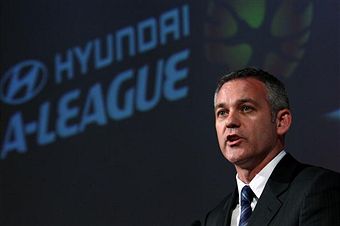By Andrew Warshaw in Zurich
October 27 – As the bidding process for the 2018 and 2022 World Cup becomes increasingly embroiled in corruption allegations and tit-for-tat spats, Australia are endeavouring to play it by the book, hoping the strategy ends up working in their favour.
As the only bidding nation without a FIFA Executive Committee member to pledge national allegiance to the cause, many were questioning whether Australia could garner enough support to get over the line as the last untapped frontier.
Now, after the events of the past two weeks, the Australian bid for 2022, despite some rocky moments back home in winning over rival codes, has never felt so good about its chances.
No Executive Committee member, therefore no help to anyone, is how one argument goes in terms of any possible illegal reciprocal deals.
The downside, of course, is that Australia have lost their number one supporter – temporarily at least.
Reynald Temarii’s vote was a shoo-in for Australia before the Oceania Confederation President was provisionally suspended by FIFA pending a final hearing.
Over coffee in downtown Zurich, Ben Buckley (pictured), chief executive officer of the Australian bid, acknowledged it could be more difficult without Temarii than with him but is still confident of getting there in the end whether the decision for 2018 and 2022 ends up being the responsibility of 22 or 24 officials.
“I can’t comment on the various allegations but it’s all about winning the respect of the 24 who choose and we’ve been very active in that respect,” he said.
“Obviously we counted on Temarii’s vote but you need 13 to win and we are still confident we have broad support.
“There was always going to be some turbulence along the way.”
Buckley insists the Australian public at large is behind the World Cup despite frequent adverse – some would say hostile – newspaper reports and the obstructive power of Aussie Rules.
He stresses the Australian bid is a bid for two confederations, not one – a powerful bargaining tool that could ultimately prove pivotal.
“You’ve got the world’s biggest confederation, Asia, and the smallest in terms of Oceania.
“It’s a frontier that needs to be won.”
He appears fed up with hearing about problematic kick-off times – that old chestnut – believing that by the time 2022 comes along, Asia will be the dominating commercial market.
“Don’t forget 60 per cent of the population will be in a favourable time zone,” he counters.
“Don’t forget too, we are not competing with Europe for this World Cup.
“We’re confident the combination of a technically excellent World Cup and a legacy in a region that has a rapidly growing appetite for football are strong arguments.”
While all but three bidding nations deciding to give this week’s International Football Arena conference a miss this week, Buckley is certain he made the right decision to make a presentation at the conference on Tuesday even though no Executive Committee members were there to watch.
Australia raised more than a few eyebrows when they were conspicuous by their absence at the Leaders In Football conference in London a few weeks ago, not least among United States officials, their main rivals.
It led to a heated dispute between both sides but Buckley insists he is the one who got it right by coming to Zurich.
The IFA, he stressed, took place in FIFA’s backyard, a stone’s throw from where the entire Executive Committee are meeting tomorrow and Friday, an ideal opportunity to kill two birds with one stone in terms of getting the message across.
“Part of the process is articulating to the football community what we have to offer,” he said.
“The fact that FIFA are meeting at the same time gave us the opportunity to talk to as many of the ExCo as we could.
“It’s a strong combination.
“I can’t comment on what others do and why they do it.
“We’ll find out in due course whether this particular strategy has worked for us.”
Contact the writer of this story at zib.l1745059990labto1745059990ofdlr1745059990owedi1745059990sni@w1745059990ahsra1745059990w.wer1745059990dna1745059990
Related stories
October 2010: Australia “almost scrapped World Cup bid” after row over stadium
October 2010: Lowy thumbs up for Australia World Cup bid but still has fears
October 2010: Iconic bridge covered in real grass for World Cup breakfast
October 2010: Aussie football chiefs sign historic National Charter
October 2010: Australian World Cup bid revved up after new Prime Minister meets Blatter

